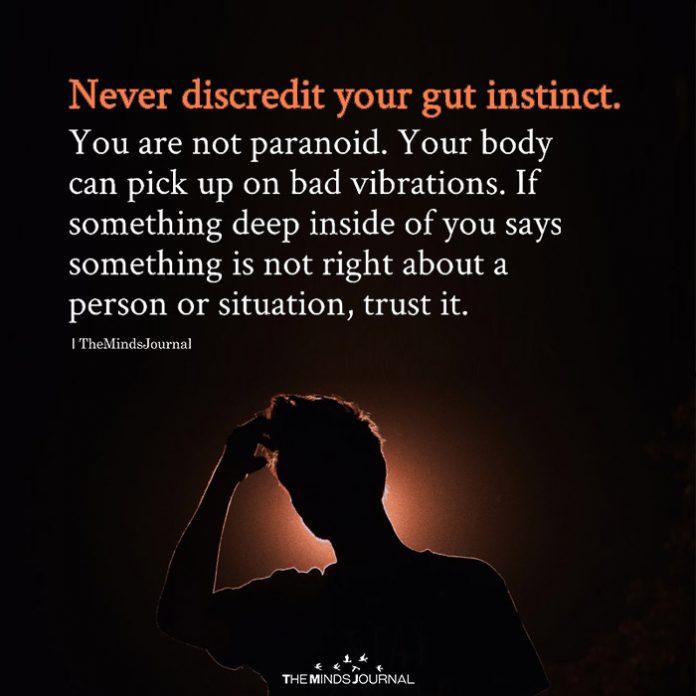Do you ever feel something in your gut and try to convince yourself that it’s nothing, but the feeling just doesn’t go away? Well, these are the signs your intuition is telling you something. This is your gut speaking up, and when your gut speaks up, you need to stop and listen to it.
Listen to your gut. We’ve all gotten that advice at some point. And it’s never for small, easy decisions either. Oh no – it’s reserved for the big ones… the scary ones… the ones with real consequences.
The problem with this seemingly super insightful advice is that no one follows it up with how exactly to go about listening to your gut. They just throw it out there like some mystical answer that’s going to blow your mind… and your left furrowing brow wondering how the F to hear your gut. There’s no instruction manual for it. It never starts with, “This is your gut speaking.”
I’ve gotten this advice more times than I can count. And I always just nodded along thinking, yes okay I’ll listen for my gut, all while hoping it would speak up in some unmistakable voice that would just tell me what to do. Well… that never happened.
So rather than continue to wait for my gut to show up, I went on a mission to find it. To root it out with the hopes of giving it a louder voice. And here’s what I’ve uncovered…
Related: 7 Common Gut Instincts You Should ALWAYS Listen To
3 Signs Your Intuition Is Telling You Something
Here are the signs you should trust your intuition and the gut instincts you shouldn’t ignore.
1. Your Brain Works Against It
Recently I was faced with a big decision… one of the scary, real consequences ones. I thought about it a lot – trying to be logical and level-headed and not make a rash decision. (Something I may or may not have a history of doing.) And in my thinking, I would catch myself talking myself into one choice and out of the other. Like I was arguing with myself.
And then it hit me – what exactly am I arguing against? Who am I trying to reason with? It was something… some kind of energy or pull in one direction… and I was only aware of it when I saw I was using logic against it. When I realized my “thinking things through” was actually a debate.
Your gut is also referred to as intuition. It is feeling rather than reasoning. And that’s what makes it so elusive. It doesn’t answer to pros/cons lists or play the “what if” game. It doesn’t speak the same language as logic or fall down to fear. And while all the thinking in the world won’t reach it… maybe reasoning will reveal it. Maybe our internal arguments are arrows aimed at our intuition. Maybe sometimes it is only through fighting our brain that our gut finds a voice.

2. It Is Difficult To Listen To
Not only is it hard to hear, but it’s often hard to follow. Because it doesn’t care about the consequences. It’s looking out for one person and one person only – you. It has a 30,000 ft view of your life and aims to keep you moving in the right direction.
It doesn’t deal with details – the obstacles you have to step over, the people you pass (or the ones you bump into), the distractions along the way, or even the small twists and turns. Those aren’t your gut’s responsibility… those are matters of the heart and mind.
And I think that’s why it’s so easy to miss – or purposely ignore – our gut. Because the road it leads us down is often difficult. It is full of the fears we haven’t faced, the desires we disregard, and the insecurities we ignore. It’s a road less traveled and for good reason – it is often easier to stay in the land of logic.

Related: 5 Gut Instincts You Shouldn’t Ignore
3. No One Understands It But You
In a world where we are constantly expected to explain ourselves, how do you explain the inexplicable? How do you stand up for something that doesn’t sit on solid ground? You can’t. Because it isn’t logical.
It’s deeper than that. It is a quiet knowing… a silent trust. It doesn’t argue; it only whispers. You are the only one who will ever hear it… the only one who can give it life… the only one who will see it for what it truly is. And the only thing you have on your side is time. Only time will reveal the reasons that others will understand.
So yes, listening to your gut comes with consequences alright. You may be judged. You may be misunderstood. You may be heading down a messy road. But know that doesn’t mean you are making a mistake… rather, you have stopped arguing with yourself and finally started listening to yourself.
Listen to The Better You Podcast with Kacie Main on Apple Podcasts, Spotify, iHeartRadio, Amazon, Pandora, or wherever you listen to podcasts.
Let us know in the comments if you ever felt the signs your intuition is speaking to you.
Written By Kacie Main Originally Appeared In Thought Catalog










Leave a Reply